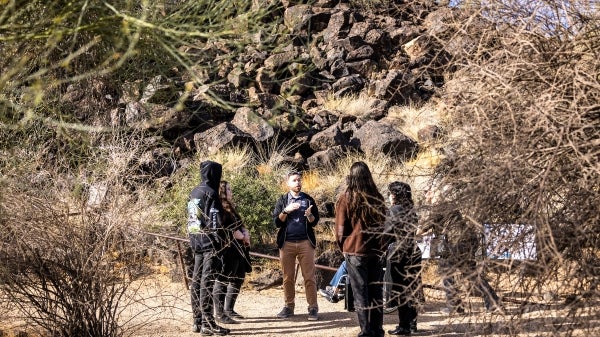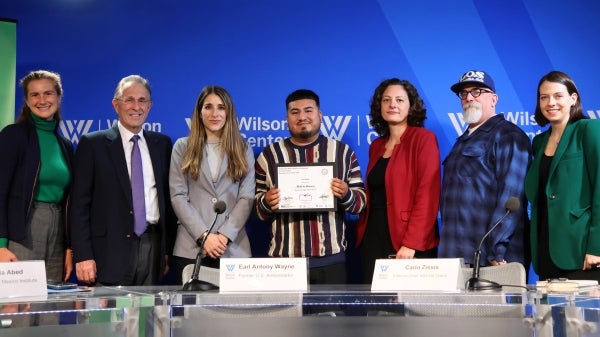ASU professor named Navajo Nation poet laureate

Arizona State University English professor Laura Tohe is being named the poet laureate of the Navajo Nation for 2015-2017. She finds writing to be like weaving; she’s continuing the legacy traditions of her mother, aunt, grandmother and great-grandmother, using some of their tools as well. Here she weaves in her Mesa home on July 13.
Photo by: Charlie Leight/ASU News
Growing up in a tiny town on the Navajo reservation, Laura Tohe relied on comics, fairy tales and books to stimulate her mind — even if that meant a four-hour round-trip drive to the nearest library.
“Since we didn’t have television, reading was a way out of the rez for me,” said Tohe, an English professor in Arizona State University’s College of Liberal Arts and Sciences. “Books took me to other places in the world and to other time eras.”
Today, the Tohe era will commence when she is named the new poet laureate of the Navajo Nation at an official ceremony in Crownpoint, New Mexico. Tohe succeeds Luci Tapahonso, who was named the nation’s first ever poet laureate in 2013.
The goal of designating a chief poet is to encourage other Navajo writers and artists and to underscore their contributions to Navajo culture.
Tohe has already contributed much to the Navajo Nation and the literary world.
She has written four books, published hundreds of poems and has had several translations of her work — including into dance and music. In 2008, Tohe wrote the commissioned libretto for “Enemy Slayer: A Navajo Oratorio” for the Phoenix Symphony.
Tohe credits a vivid imagination and the lack of a family television to her success.
“I was introduced to reading with the ‘Dick and Jane’ series at school,” she said. “I gravitated to fairy tales, and when my mother could afford it, she bought me ‘Little Lotta,’ ‘Richie Rich’ comics and later my brothers reluctantly let me read their comics — ‘Superman,’ ‘Batman’ and others.”
Tohe grew up on the reservation in Crystal, New Mexico, near the Chuska Mountains on the eastern border of the Dine/Navajo homeland. The town’s population hovered just above 300 people, and outside of attending school, there wasn’t much to do. Storytelling was not only a way to pass the time, but an art form among her people.
“One time I drove with my grandparents down Highway 666, and they recounted all of the places where a relative died or some incident happened. It was a highway of stories,” Tohe said. “I grew up with an oral tradition, and that has been my biggest influence in developing my voice and my work as a poet and writer. ‘You don’t have anything if you don’t have stories,’ is what my mother used to say.”
Tohe said as a child she told such captivating stories that a family friend would come over to listen to her when she’d go on a tear. Her stories eventually grew into poetry and sometimes prose poetry.
“Dine people, like many indigenous peoples, have always had great reverence for language, for sacred words and how they are used in meditations,” Tohe said. “For example, prayers and song meditations are used to heal and restore health and wellness for someone suffering from a certain illness. It can also uplift the human spirit.”
In her duties as poet laureate, Tohe wants to help uplift the Navajo people, specifically the next generations.
“I would like to see our younger generation continue the tradition of writing poetry, what we call ‘Saad Naazhch’aa,’ which translates to ‘pictures with words,’ ” Tohe said. “We didn’t have a word for poetry a few years ago. Since our language has diminished with the boarding-school era, poetry can be one of the ways to revitalize and save the Navajo language.”
More Arts, humanities and education

Petroglyph preserve celebrates 30th anniversary with ancient, modern tales
The Deer Valley Petroglyph Preserve provides a beautiful walk through a pristine desert where chuckwalla lizards are as plentiful…

Kaleidoscope short film contest inspires powerful binational filmmaking in its second year
“We come to this country not to steal anybody’s jobs but to take advantage of the opportunities that the rest ignore. We’ve been…

ASU's Neal Lester reflects on life, death of poet Nikki Giovanni
When Neal Lester heard on Monday that poet and activist Nikki Giovanni had died, the news hit hard.Lester, the founding director…